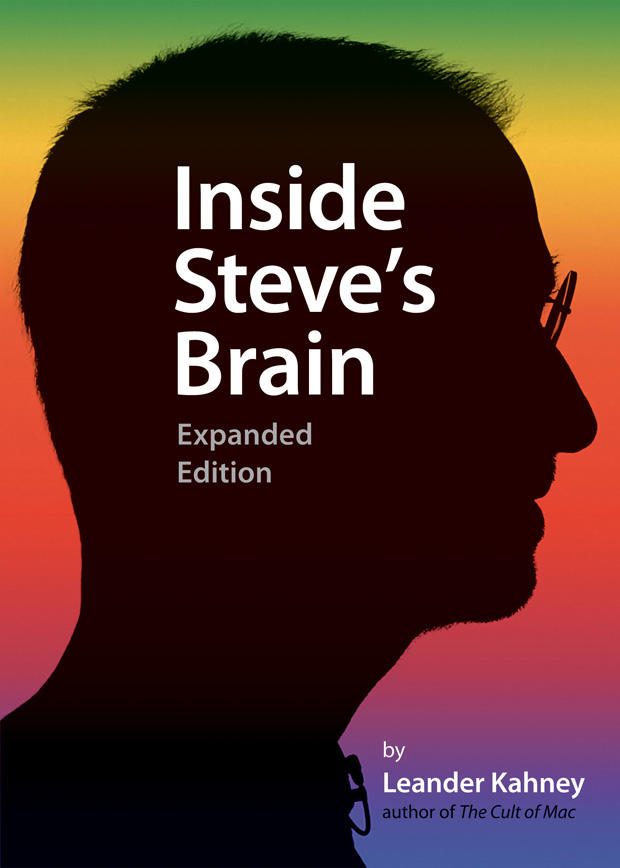Coinciding with Steve Jobs return to the public eye next week, Penguin Portfolio is reissuing my book Inside Steve’s Brain with a new chapter about how Apple will cope without its dynamic CEO.
Published in April 2008, Inside Steve’s Brain was a New York Times best-seller and an international hit (translated into 15 languages and a best-seller in Brazil and Italy). But the book was written before Jobs’ recent liver transplant, so the publisher asked me to update it for a second edition.
Jobs will take the stage next week at Apple’s special press event to show off new holiday iPods to the press. He has to: If he doesn’t show up Sept. 9, there’ll be a media shitstorm and Apple’s stock will tank.
Jobs’ last public appearance happened exactly a year ago. Last Sept. 9, he presided over a similar iPod event at the same venue. Bloomberg had accidentally published Jobs’ obituary, and when he appeared onstage he flashed a slide with Mark Twain’s famous line: “The reports of my death are greatly exaggerated.”
Indeed. One liver transplant later, Jobs is still with us, thank God. But there will be a time when Apple will have to do without its supreme leader, and as I explain in the new chapter of Inside Steve’s Brain, the company will be both royally fucked and totally OK when the inevitable happens.
This post contains affiliate links. Cult of Mac may earn a commission when you use our links to buy items.
No one has a record like Jobs. He revolutionized computing with the Apple II and the Mac, digital music with the iPod, digital animation with Pixar, and now communications and mobile computing with the iPhone. And just wait until you see the tablet.
No one else possesses such a track record of innovation. But Jobs is also one hell of a corporate leader. In the last 10 years, he’s remade Apple in his image. He’s run the company with such tight reins that it has become the embodiment of his personality, both good and bad. The secrecy, the tight control — this comes from Jobs. But so does the innovation, the ease of use, and the commitment to a great experience.
Jobs has institutionalized his personality traits at Apple. It’s a process called the “routinization of charisma,” a term coined by sociologist Max Weber. In corporations, the routinization of charisma is the process of turning a charismatic business leader’s personality traits into business processes, and Jobs has already done this at Apple.
Take the company’s prototyping process, which sees new products made and remade over and over, and then started over from scratch. This is how Jobs develops such beautifully disruptive products. He doesn’t dream them up from whole cloth; he discovers them through obsessive, perfectionist prototyping. But now the company does it automatically. Jobs’ perfectionism has become institutionalized.
The routinization of charisma has been studied many times. Sometimes it is successful (IBM or Wal-Mart) and sometimes it isn’t. But I’m confident that it’s already working at Apple, because Tim Cook, Jobs’ second-in-command, said so. During a conference call last year with Wall Street analysts and press, Cook made a statement about Apple’s philosophy that really struck a chord with me, because it mirrors almost exactly what’s discussed in my book. Here’s what Cook said and how it’s covered in Inside Steve’s Brain:
“… the values of our company are extremely well-entrenched (Chapter 9 — how Jobs’ charisma has been routinized). We believe that we’re on the face of the earth to make great products and that’s not changing. We’re constantly focusing on innovating (Chapter 6 – how Jobs’ focus on products drives innovation). We believe in the simple, not the complex (Chapter 2 – how Jobs’ despotism forces staffers to find the simplest solution). We believe that we need to own and control the primary technologies behind the products that we make (Chapter 8 — how Jobs’ control-freak tendencies are expressed as vertically integrated products). And participate only in markets where we can make a significant contribution. We believe in saying no to thousands of projects so that we can really focus on the few that are truly important and meaningful to us (Chapter 1 — how Jobs focus and saying ‘no’ saved Apple).
We believe in deep collaboration and cross-pollenization of our groups which allow us to innovate in ways that others cannot (Chapter 4 — how Jobs’ has created a nonlinear workflow among small, flexible work groups). And frankly, we don’t settle for anything less than excellence in every group in the company (Chapter 3 — how Jobs’ perfectionism drives Apple’s product-design process) — and we have the self honesty to admit when we’re wrong and the courage to change.”
Cook concluded with a line that may not have convinced Wall Street (Dan Frommer at Silicon Alley Insider remained skeptical). But I found it pretty compelling. Cook said: “And I think regardless of who is in what job, those values are so embedded in this company that Apple will do extremely well.”
I think so, too.
Inside Steve’s Brain, Expanded Edition, is available on September 3, from these fine booksellers. It is also available in a digital edition for iPhone or Amazon’s Kindle.




